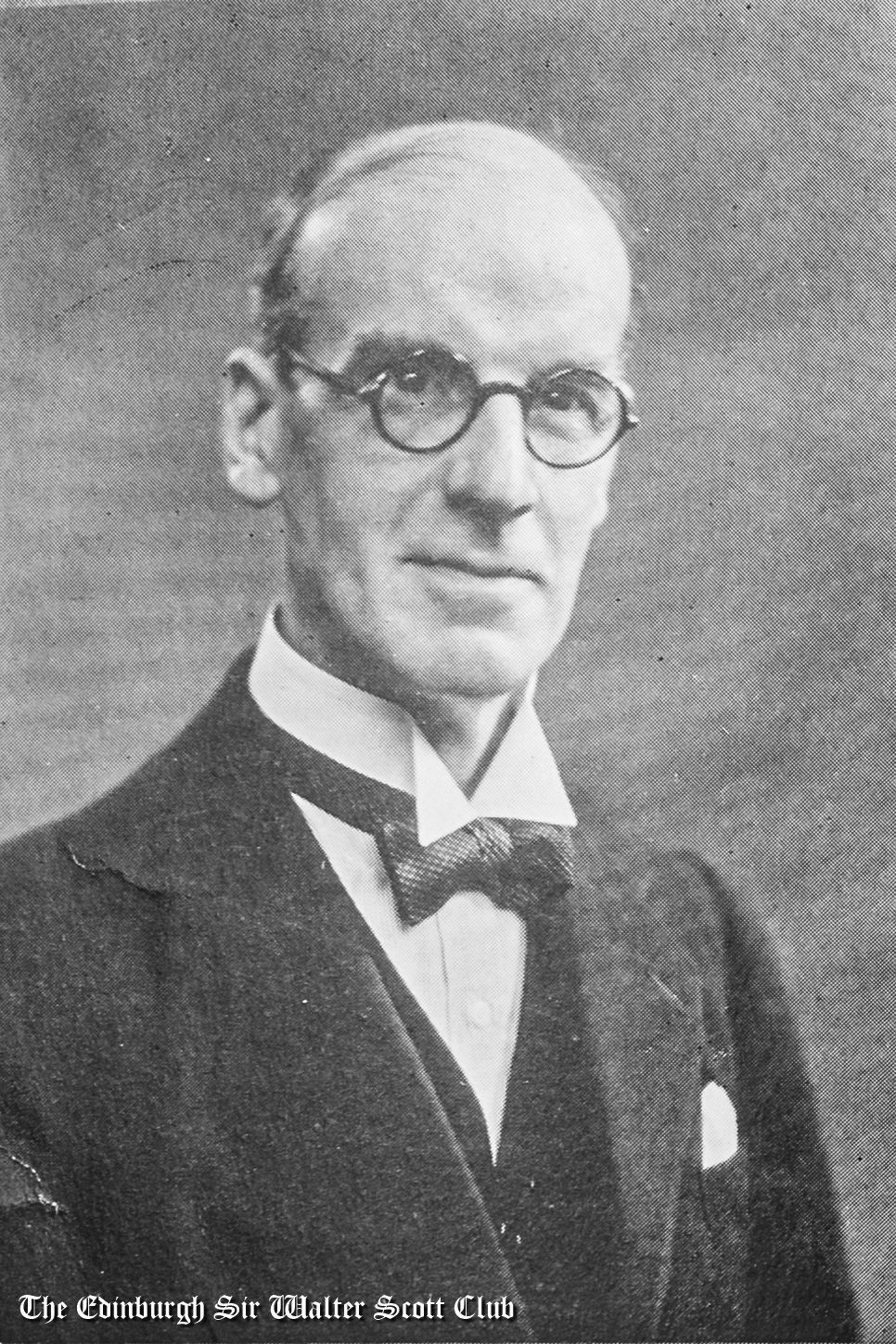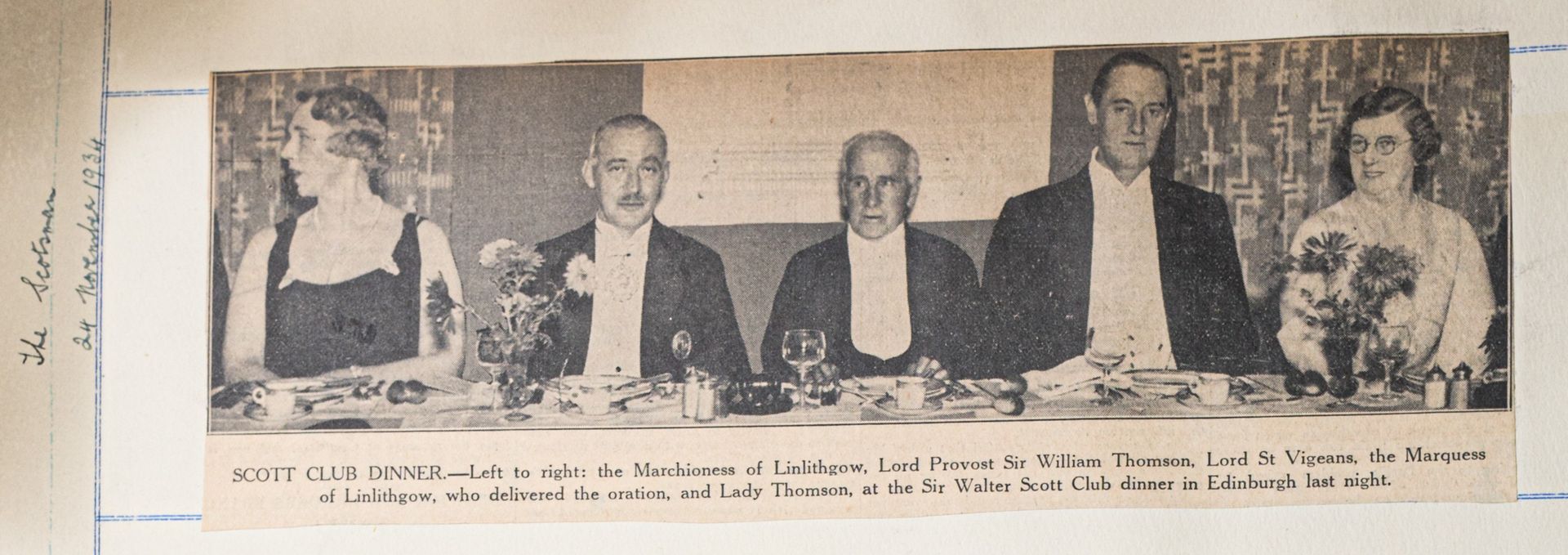1935
Our President in 1935 was:
The Right Hon. Lord Macmillan
He proposed the Toast to Sir Walter at our 36th Annual Dinner on Friday 29th November 1935 in The North British Station Hotel.
Download the [transcript] or read the [bulletin]
Summary of the Speech:
Lord Macmillan reflected on the rich tradition of tributes paid to Scott by previous Presidents. Acknowledging he could add little new, he focused instead on recent events and observations.
He praised the strong historical link between the Scottish legal profession and literature, highlighting how Scott’s background as an Advocate shaped his novels, with many detailed references to Scots Law.
He celebrated the recent discovery of 57 letters between Scott and his wife, found hidden in a secret drawer—remarkable insights into Scott’s private life.
Macmillan also recounted the impressive international admiration for Scott, particularly a grand 1933 centenary event at the Sorbonne in Paris, where Scott was hailed almost as a national figure in France.
He touched on Scott’s impact in popularising Scotland both at home and abroad, his mixed feelings about London society, and his associations with prestigious clubs like the Athenæum and "The Club".
The toast ended with a personal reflection on the timelessness of Scott’s works across generations.
Interesting points worth mentioning:
- Scott and Scots Law: Macmillan emphasised Scott’s deep use of Scots legal tradition in his novels, suggesting that modern scholarship (even then) was only just beginning to appreciate its extent. He even found 70 legal allusions in The Antiquary alone.
- Discovery of Scott’s love letters: 57 private letters surfaced recently (in 1935) from a hidden compartment in Scott’s desk. This romantic, almost "storybook" find deepened the emotional connection to Scott’s personal life.
- Scott’s popularity in France: At the Sorbonne celebration, Scott was not treated as a foreign author but embraced as part of French cultural heritage. The anecdote of a French family treasuring worn copies of Scott’s novels across generations was especially touching.
- Scott’s "invention" of Scotland: A French visitor, Charles de Boigne, claimed that Scott "invented" a romanticised version of Scotland and then made it fashionable, influencing how both Scots and visitors perceived the country.
- Scott’s ties to London’s literary elite: Scott was an original committee member of the Athenæum Club and a member of "The Club," founded by Samuel Johnson and Joshua Reynolds, linking him to the very highest literary circles.
- A charming personal story: Lord Finlay shared how Scott once read Tales of a Grandfather in manuscript form to Finlay’s mother as a child—and that Finlay himself continued the tradition by reading it to his granddaughter, a lovely example of Scott’s enduring family appeal.
Download the [transcript] or read the [bulletin]
List of Members Present
The Annual Dinner of the Club was held in the North British Station Hotel, on Friday, 29th November 1935, when the Right Honourable Lord Macmillan presided over a company of 290. The Croupiers were Lord St Vigeans, Mr A. W. Russell, and Mr William Bonnar. Among those present were the Lord Provost of Edinburgh and Mrs Gumley, Lord Normand, Lord George Nigel Douglas-Hamilton, Brig.-General E. Craig Brown, Sir Andrew Grierson, Sir William L. Sleigh, Sir William C. Johnston, Sir Joseph and Lady Dobbie, Dr Darling, Dr A. O. Curle, Lady Vivian Younger, Dr W. K. Dickson, Dr H. W. Meikle, Dr Alexander Mitchell, Dr King Gillies, Dr Archibald Milne, Professor John Fraser, Sheriff Orr, Mr Robert Gilkison (grandson of the "Ettrick Shepherd"), Rev. A. P. Sym, Mr J. B. Adshead, Mr A. B. Campbell, Mr T. J. Millar, Mr James Milligan, Mr Kenneth Sanderson, Mr W. M. Parker, Mr W. Glassford Walker, Mr William Whyte, Dr Charles A. Malcolm, Mr J. L. Clyde, Mr Douglas A. Foulis, Mr Edward Boyd, Mr Will. Y. Darling, Mr G. J. Scott, Mr R. T. Skinner, Mr E. A. Savage, Mr Alexander Morrison, Honorary Auditor, Mr Alexander Laurie, Honorary Treasurer, and Mr William Watt, Honorary Secretary.

Subsidiary Toasts Summary
- The King and The Royal Family: These toasts were formally honoured without detailed comment recorded.
- The Imperial Forces:
Proposed by the Chairman and replied to by Lord George Nigel Douglas-Hamilton.
He spoke about the need to consider merging the three Services (Army, Navy, Air Force) under a single Ministry of Defence. He defended the armed forces against the post-war stigma associating military discipline with a desire for war, comparing it cleverly to blaming firemen for a house fire. He paid tribute to Lord Jellicoe’s wartime leadership and sacrifice, quoting Lord Tweedsmuir’s hope for a future without war but emphasising the lasting value of soldierly virtues. - The City of Edinburgh:
Proposed by Brigadier-General E. Craig Brown.
He took the audience on a lively historical journey from Edinburgh's geological beginnings to early settlers and medieval foundations, through the wars of independence and Stuart times, to the Union of the Crowns and later literary and cultural flourishing, especially under Sir Walter Scott. He praised the work of modern Lord Provosts and encouraged reflection on the everyday heroism of Scott’s own perseverance after his financial ruin.
He coupled the toast with the name of the current Lord Provost, Lord Provost Gumley. - Reply by the Lord Provost (Lord Provost Gumley):
He warmly accepted the toast, reflecting on the city's rich history and development, particularly around the year 1771 (Scott’s birth year).
He regretted the loss of some historic Edinburgh architecture but was hopeful about growing public interest in preservation. He pledged his personal commitment to protecting Edinburgh’s historic character. - The Chairman:
A toast to Lord Macmillan (the evening’s Chairman) was proposed by Lord Normand.
He praised Macmillan’s wide-ranging achievements as a lawyer, judge, literary enthusiast, educational leader, and public servant. He compared Macmillan’s career to the ideal set by Scott’s character Counsellor Pleydell in Guy Mannering: a lawyer enriched by knowledge of history and literature.
Macmillan was described affectionately as “an institution” in his own right. - Entertainment:
Mr Philip Malcolm performed a selection of songs, accompanied by Mr J. W. Cowie.
Interesting points worth mentioning:
- Proposal for a Ministry of Defence: Even in 1935, there was a call for merging the separate Services under one ministry—a major structural change that would later happen (Ministry of Defence formed officially in 1947).
- Defence of the armed forces’ honour: Lord George Nigel Douglas-Hamilton made a powerful defence of military values in an era of rising pacifism, comparing discipline in the armed forces to the essential role of a fire brigade.
- Romantic yet realistic view of Edinburgh: Brigadier-General Craig Brown beautifully blended myth, geology, early settlement, and historical narrative to create a vibrant picture of Edinburgh’s origins and growth, linking it to Sir Walter Scott’s enduring legacy.
- Public architecture and preservation: The Lord Provost’s speech shows an early awareness of architectural preservation—an issue that would become even more prominent in the 20th century.
- Affection for Lord Macmillan: Lord Normand’s tribute captured the deep respect and personal affection held for Macmillan, portraying him not just as a distinguished professional but as a beloved son of Edinburgh.
Download the [Subsidiary Toasts] to read in full.



